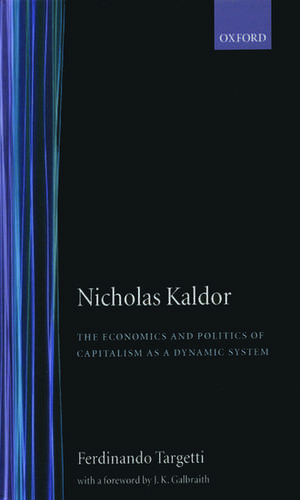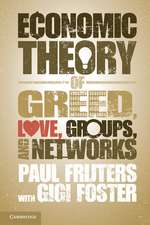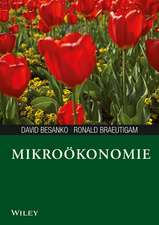Nicholas Kaldor: The Economics and Politics of Capitalism as a Dynamic System
Autor Ferdinando Targettien Limba Engleză Hardback – 8 oct 1992
Preț: 1173.99 lei
Preț vechi: 1781.59 lei
-34% Nou
Puncte Express: 1761
Preț estimativ în valută:
224.71€ • 244.17$ • 188.88£
224.71€ • 244.17$ • 188.88£
Carte tipărită la comandă
Livrare economică 09-15 aprilie
Preluare comenzi: 021 569.72.76
Specificații
ISBN-13: 9780198283485
ISBN-10: 0198283482
Pagini: 416
Ilustrații: line drawings, tables
Dimensiuni: 165 x 242 x 30 mm
Greutate: 0.84 kg
Editura: Clarendon Press
Colecția Clarendon Press
Locul publicării:Oxford, United Kingdom
ISBN-10: 0198283482
Pagini: 416
Ilustrații: line drawings, tables
Dimensiuni: 165 x 242 x 30 mm
Greutate: 0.84 kg
Editura: Clarendon Press
Colecția Clarendon Press
Locul publicării:Oxford, United Kingdom
Cuprins
Introduction: The Life of Nicholas Kaldor; 1. Equilibrium, Competition, and Capital Theory; 2. Wages, Speculation, and Interest; 3. The Trade Cycle; 4. War Economy, Welfare State, and Full Employment; 5. Cambridge and the Theories of Growth and the Distribution of Income; 6. The Debate on Kaldor's Theory of Distribution; 7. Growth at Different Rates and Kaldor's `Laws'; 8. The `Agriculture-Industry' Model and the Instability of the World Economy; 9. Underdevelopment, Industrialization, and Policies for Development; 10. Public-Finance Policy; 11. The Interest Rate, Monetry Policy, and the Supply of Money; 12. Inflation and Anti-Inflationary Policies; 13. The International Monetary System, Managing an Economy in an Open Market, and the De-Industrialization of Britain; 14. The Criticism of Equilibrium Theory and New Theoretical Hypotheses on Growth and the Distribution of Income; 15. Method and Vision of the World; Appendix; Bibliography; Index.
Recenzii
'The comprehensiveness of the book's coverage of Kaldor's writings makes it something most readers will wish to read selectively rather than from beginning to end. The book ... provides a very clear account of Kaldor's economics and a number of useful insights concerning this very remarkable economist.'Times Higher Education Supplement
Excellent book.
Excellent book.












